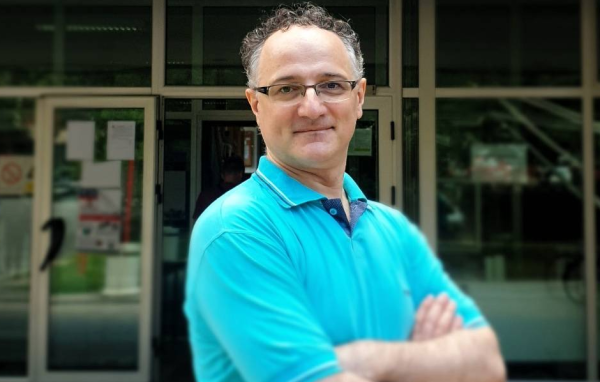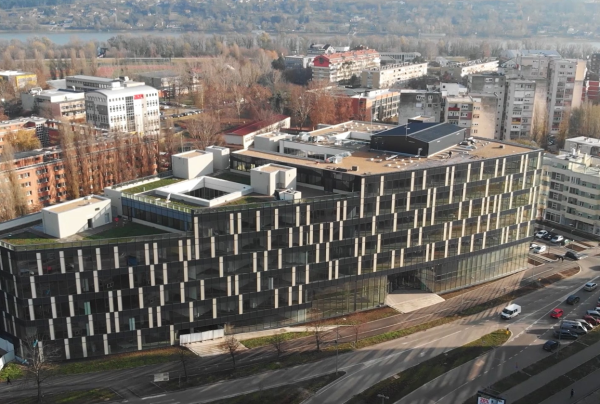Embedding Responsible Research and Innovation in the Western Balkans

What is Responsible Research and Innovation? How developed is this concept in the Western Balkans?
We consult a Horizon 2020 project WBC-RRI.NET funded by the European Commission to learn more. The project fosters the application of Responsible Research and Innovation (RRI) at the territorial level in five Western Balkan Research and Innovation (R&I) ecosystems.
Apart from this, it promotes a multi-level governance framework for steering R&I in the Western Balkans.
We invited the project coordinator, prof. Goran Stojanović (University of Novi Sad, Serbia) to explain in some detail the project and the concept behind it.
What is Responsible Research and Innovation and why it is important?

Goran Stojanović: RRI is a key enabler in connecting all actors in the quadruple helix model. It is a driving force for creating innovative products and services for the benefit of our society. Responsible Research and Innovation should be the main component of our daily activities, regardless of whether we are researchers or CEOs or decision-makers.
High ethical standards, gender equality and respecting the rights of all groups should be above all of us. Also, science education is a pillar of a democratic environment while open science is a vehicle for ensuring higher public engagement around important processes in our society.
This makes sense. However, is the RRI concept relevant for the Western Balkan economies as laggards compared to the EU average? Why?
Although the WB region significantly improved its innovation performance within the last ten years, the focus of research and innovation efforts should be directed towards bridging the ‘gap’ with other European regions. RRI principles can act as enablers for the sustainable development of the local R&I systems and for enhancing smart specialisation strategies (S3). These should evolve around societal challenges and citizens/societal actors’ participation.
The effectiveness of S3 strategies has already been acknowledged in various EU Member States. S3s can potentially contribute to the socioeconomic development in the WB by promoting cross-sectoral innovation based on existing competitive advantages and extending them through diversification.
One of the regional goals is to develop a regional innovation ecosystem. How your project fits into this framework and which practical benefits does it offer to the participating partner organisations?
Targeted RRI dimensions are distributed in the following way: Kune-Vain-Tale Lagoon wetland ecosystem (Albania): Public Engagement (Citizen Science) and Governance; Republika Srpska region (Bosnia and Herzegovina): Ethics, Science Education and Open Access; Montenegro: Public engagement and Governance; City of Skopje planning region (North Macedonia): Science Education and Gender Equality and Autonomous Province of Vojvodina (Serbia): Public Engagement and Open Access.
The WBC-RRI.NET project should develop concrete actions within individual beneficiaries' organisations. For example, agenda setting and institutional changes in the fields of gender, ethics, public engagement, science education and open access. Concrete actions are also envisaged in the territorial context such as local and regional governance relations and decision-making processes.
Consequently, new governance relations and decision-making processes will emerge and spread to the territorial context as well. This is particularly important while attempting to integrate the RRI principles in the existent/upcoming territorial S3 policies of the WB economies.
Changes should be sustainable (i.e. last beyond the lifetime of funding), for instance through the introduction of new forms of decision-making, development of business plans or co-operation agreements, and through institutional changes in participating organisations.
What do you expect to achieve by the end of the project?
The WBC-RRI.NET project will help enhance R&I planning, including smart specialisation strategies in the WB. It will foster strong socioeconomic development while informing R&I policy and enabling the region to address its needs.
At the end of the project, it will have sparked open dialogue, created a regional network and helped the WB economies to contribute to a single and borderless European Research Area.
Testimonials or why do we need Responsible Research and Innovation
Albania
The focus of the WBC-RRI.net project in Albania is to pilot a citizen science initiative in a vulnerable natural ecosystem in Lezhe, namely the Kune-Vain lagoon. The area is characterised by its unique biodiversity and a high potential for sustainable tourism. However, it is currently under immense pressure from urbanization and climate change effects.
 The RRI pilot initiative will support a participative assessment method on ecosystem services. This includes participatory flood mapping that will enhance knowledge of climate effects and vulnerability. Also, increasing cooperation between decision-makers and local stakeholders, and empowering the quadruple helix network in the Qark of Lezha.
The RRI pilot initiative will support a participative assessment method on ecosystem services. This includes participatory flood mapping that will enhance knowledge of climate effects and vulnerability. Also, increasing cooperation between decision-makers and local stakeholders, and empowering the quadruple helix network in the Qark of Lezha.
This type of evaluation is developed for the first time in Albania. This initiative puts into the application the governance of RRI by empowering local users/stakeholders with the knowledge to be used in steering decision-making and governance of the common resource and introducing a scientific method embedded with RRI principles in Albania.
Bosnia and Herzegovina
Our big vision is to improve the research and innovation ecosystem of Republika Srpska (Bosnia and Herzegovina), which could be partly facilitated through RRI in a long-term perspective. Although there are already some positive movements both at the policy and practical levels, there is always room for improvement.  Thus, the changes we foresee as a result of the WBC-RRI.NET activities in Republika Srpska are:
Thus, the changes we foresee as a result of the WBC-RRI.NET activities in Republika Srpska are:
- At least one grant scheme of the Ministry of Scientific and Technological Development, Higher Education and Information Society of Republika Srpska will introduce RRI elements in submission and evaluation criteria;
- At least 5 secondary schools in Republika Srpska will improve their teaching practices towards gender-inclusive STE(A)M education; and
- At least 2 Higher Education Institutions will introduce Gender Equality Plans and improve ethical standards and open access practices.
Montenegro
Introducing RRI principles in Montenegrin society will significantly contribute to the development of public policy solutions such as funding instruments, structuring projects, and research activities for business and society) that can contribute to merging RRI and the Strategy of Smart Specialization (S3).
 Having in mind that Montenegro is the first non-EU economy that already adopted the S3 strategy, introducing and implementing RRI principles in future development will help in S3-related practices for the creation of well-functioning ecosystems, based on S3 goals, and environmental issues as well.
Having in mind that Montenegro is the first non-EU economy that already adopted the S3 strategy, introducing and implementing RRI principles in future development will help in S3-related practices for the creation of well-functioning ecosystems, based on S3 goals, and environmental issues as well.
North Macedonia
A considerable capacity challenge in Skopje is the insufficient number of IT experts. At the same time, there is a demand for such expertise and ICT is suggested as a horizontal priority (S3 mapping) in North Macedonia. The shortcomings of digital challenges need to be addressed concurrently, mainly by employing a multidisciplinary approach and widening the scope of science, as part of STEAM, by promoting its creative and cultural dimension within the educational context.
 Concerning gender equality, the participation of women in STEM (particularly ICT) is pretty modest in Skopje. Additionally, the need to promote the multicultural aspect of the region and societal inclusion has become more prominent. Therefore, the RRI focus will be on creating strategies and developing activities to decrease gender discrimination or enhance the professional development of female entrepreneurs.
Concerning gender equality, the participation of women in STEM (particularly ICT) is pretty modest in Skopje. Additionally, the need to promote the multicultural aspect of the region and societal inclusion has become more prominent. Therefore, the RRI focus will be on creating strategies and developing activities to decrease gender discrimination or enhance the professional development of female entrepreneurs.
Serbia
The project's focus in Serbia (Autonomous Province of Vojvodina) is twofold. First, to foster a connection between the scientific communities and the industrial sector & society. Second, to improve cooperation among them, which means enhancing public engagement in RRI.

In addition, the emphasis is on full implementation and wider usage of BE-OPEN open repository. This means providing a new bank of easily accessible and free-of-charge knowledge for our society. The purpose is to create an environment to boost progress in the Enhancement of Self-Sustaining R&I Ecosystems initiatives.
